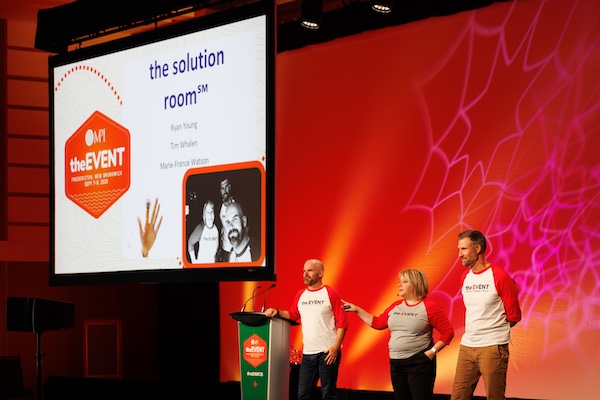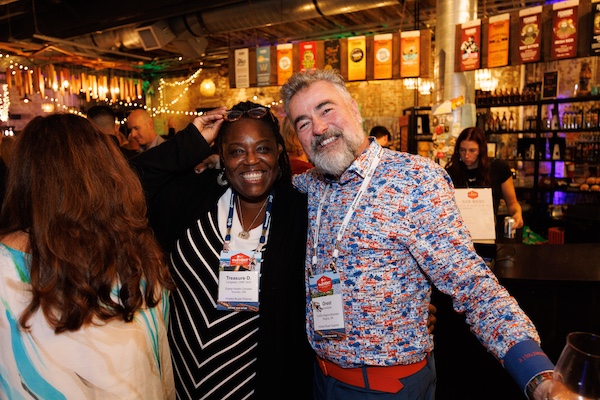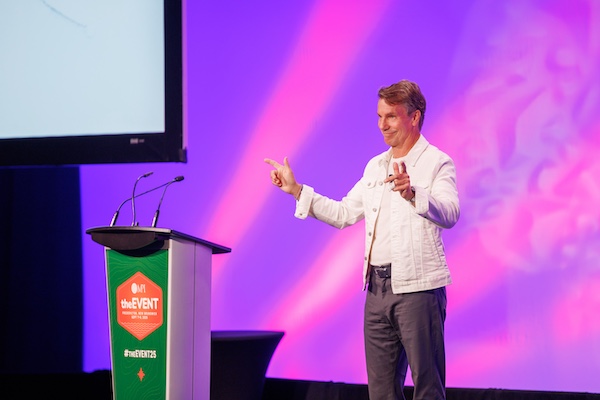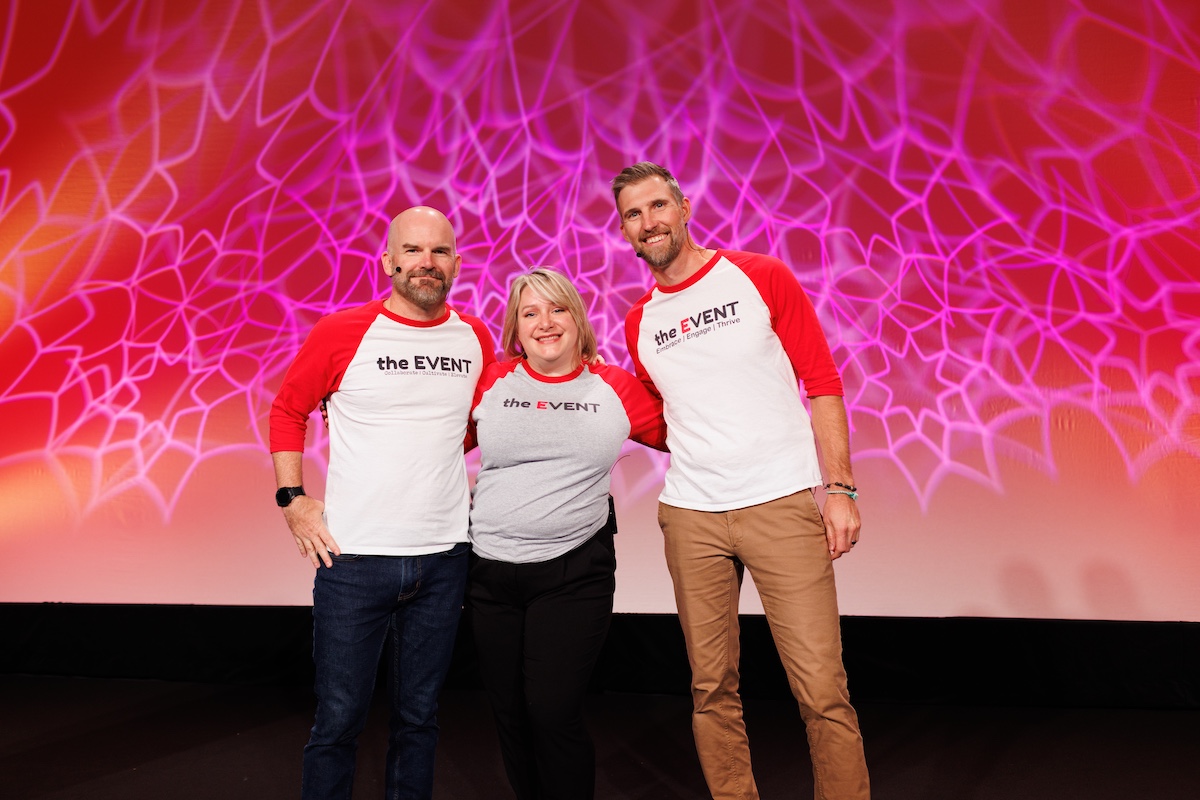Images courtesy Justin Dutcher Photography
MPI’s theEVENT this September, excelled in delivering a Canadian-focused conference for a Canadian audience, leveraging the event industry’s strong community focus as well as the hospitality and sense of place Fredericton, New Brunswick, availed.
While Marie-France Watson, CED (MPI France-Switzerland Chapter), senior conference manager at MDPI - publisher of Open Access Journals; Tim Whalen, CMP (MPI Toronto Chapter), strategic manager, resort sales, Fallsview Casino Resort; and Ryan Young (MPI Ottawa chapter), assistant managing director of sales - Canada, Hilton Worldwide Sales weren’t running the show for theEVENT 2025, they remained involved and delivered the audience-favorite closing keynote, The Solution Room.
Can you share what your involvement looked like this year and how it went?
Ryan Young: This year, it was nice to kind of nice for us to see our baby grow up and really just be more in more of an advisory role to provide feedback and to continue to help the transition from the chapter level and to have MPI global come on and manage it.
Marie-France Watson: The Solution Room was really important because one of the pillars of theEVENT was always the peer-to-peer learning. Experimenting and disrupting and creating experiences—all of those things are important—but another super-important factor is the peer-to-peer learning. We built it on the ethos that the experts are all around you. The peer-to-peer learning is arguably more important than the talking heads on stage and The Solution Room really allows that—it’s a place where, OK, you went through 2.5 days of education, but we know you get back to the grind at work and people can forget [what they learned]. The Solution Room is an opportunity to take stock of everything that happened and take the learning into your own hands.
You have to make it actionable when you get back home and The Solution Room is a great way to enable that, get some feedback from your peers, really focus on your problem. This forces people to really put it out there and be accountable to themselves but also to those peers that helped them come up with an answer. Of course, the grand finale is when they lift the page and see the postcard—they have to write themselves a note that they’ll receive in about six weeks that’s like, “Hey, you said you were going to do this.” What better reinforcement is that from your past self to your future self?
Tim Whalen: We’ve always said, from the beginning, that the experts at theEVENT aren’t the talking heads on stage, they’re in the audience, they’re in your breakouts—they’re all around you. The Solution Room flows with that idea then it turns the closing session back on attendees, allowing them to come up with an issue or a topic or a challenge that’s popped into their minds during the event. That allows them to, with their peers, kind of work through the issue and go home with a concrete way to implement that back into their systems. Usually, most events close with an inspiration talk from someone who’s climbed a mountain or done amazing things, but we told people that inspiration wasn’t going to come from us, it was going to come from them and their peers. A different spin on how to close an event.
Young: We had such good feedback on The Solution Room last year, that we wanted to bring it back again this year knowing that there’d be a lot of new attendees. And we did get the feedback that it was very valuable, again—to be able to go through that concept to wrap up the event. Essentially, you’re going around the table and you everybody has a challenge or thing they want to address and you get seven peer inputs on it to help you solve that challenge. Then at the end, we had a fun activation where you fill out a postcard with some of the biggest learnings and takeaways for your challenge and then theEVENT team will mail that postcard back to you after a little bit of time passes to make sure that you’ve actioned it and to follow up on it as a reminder.

How was the energy onsite and were there specific elements that you repeatedly heard participants praise?
Whalen: Right off the bat, the Fredericton hospitality was off the charts. I’d have that at No. 1.
Young: Yeah, it starts with the destination that rolled up their sleeves and rolled out the red carpet for the event community to come into their destination. All the local businesses were ready for us and aware that we were in town—starting from hopping on the shuttle when you arrived at the airport with music, some beverages in the bus, to get you down to the hotels. Then further to that, the Fredericton piece would be the actual event groups including new people coming into MPI—just the overall sense of community at theEVENT where everyone was learning together, working hard but then at the night-time events, everyone had just an absolute blast with Fredericton. I think new friendships were created with that—and you don’t always see that at a more professional, kind of stuffy conference.
Whalen: 100%. I think those two elements, there was a certain newness because theEVENT has always been held in bigger destinations—Toronto, Ottawa or Montreal—and that sense of destination and community was definitely different this year hosting in a smaller community where we kind of took over the destination. Then to Ryan’s point, I think the mix of attendees was a little different this year because we moved theEVENT outside of the triangle we originated in, but the feeling of community and bringing a group together in shared experience was bang on—the same as it’s always been.
Young: And that’s it, right, the concept remains constant and yet you’re bringing in new people who then get to experience it—that’s how you grow it—and they felt the vibe and the energy. What I think we’ve done a little differently than some of the other industry conferences up here is we carved out a sense of innovation—“come to theEVENT to be inspired, to learn”—but it’s a little bit more casual than the other conferences out there. It’s a safe space to come and try stuff—we always say, “We’ll try it at theEVENT and if it doesn’t work, then we’ve proven to you that you don’t have to try this at your own events, but we’re willing to take the risk and try these things so you can go back and look like rock stars when you make these decisions on your own meetings and events.
Whalen: We’ve always been a proponent of taking calculated risks. Like Ryan said, this is the format and forum to do that. If you take 10 risks and nine of them don’t work out, you’re going to hit the tenth out of the park and it’s going to be a gamechanger.
Watson: That kind of hospitality and very focused attention did a lot. We hadn’t had that [before]. People felt really connected and we could walk anywhere. That really resonated. But I feel like the idea of telling and sharing stories was a really big point that came up. If you look on LinkedIn, the feed is wild, people really enjoyed their experience! Fredericton also had 40 volunteers that make our experience that much better. It was super special and everyone felt like they were on VIP carpet the whole time. There’s a certain charm there that’s pretty unique.

What about a favorite aspect of yours from theEVENT?
Young: All of the night-time events were good fun and that’s where you get to know people the best sometimes and where people open up about their days. For me, I think the biggest excitement I have after this year is just the energy at theEVENT and the reinforcement that we did come up with a concept that still works and is still relevant. When we were up on stage at the end doing the keynote, it wasn’t about us: the feedback was that people are so energized just to be back at the event and that people still believe in the direction that it’s going—that was very flattering and humbling at the same time.
Whalen: Yeah, I think that is true, to see the evolution. It started out as the three of us and quickly grew to an army of volunteers. But then we hit a point along the way where it was no longer feasible for volunteers to continue this and take it to the next level—it was too taxing on the volunteer base of our chapters. There were some touch-and-go points where we didn’t know if theEVENT would continue on. Now that MPI global has undertaken this for two years, to see that it’s on solid footing again, I think it great. The concept is still relevant. The guidelines and the philosophy behind theEVENT are still relevant. So I think that’s a very proud moment for the three of us—to see the evolution and that things have changed but they’ve also remained the same.
Young: Another piece that really excites me is to see the acceptance from the MPI team and the executives there that it’s a Canadian conference, it has to be done a little bit differently—it’s not just a rinse-and-repeat from MPI’s World Education Congress (WEC) or European Meetings & Events Conference (EMEC)—they got the flavor of the Canadian community and they’ve picked up on it and I can see the excitement in their eyes of all the things they’d like to tweak for next year to elevate it even more. The buy-in from the MPI global team this year was very apparent and excites me for what lies ahead.
Watson: I had a few. Mike Downie was a big highlight, that was a great opening to set the tone, especially in this day and age—very on point. The Rendezvous event was excellent at Picaroons Roundhouse, just one of the most amazing venues I’ve been to—and with live band karaoke! There were some showstopper voices out there—there were grown men really getting into it and it was so sweet! The live band made it so big and so cool, the venue was indoor and outdoor and the food was amazing

How about key takeaways—any you’d like to share?
Whalen: For me, besides the hospitality of the community, the opening keynote of Mike Downie was unbelievable. He’s a Canadian documentary filmmaker and the brother of Gord Downie, who was a huge Canadian rock ‘n’ roll legend here in Canada. To hear his opening keynote on the power of storytelling and how he connected it back to really strong pieces of Canadiana really tied into our culture at this time, politically and socially and with what’s going on in the conference industry as well…that hit it out of the park, it was amazing and timely.
Young: Yeah, and that speaker down at WEC just wouldn’t resonate, right? It wouldn’t have the same power. It was a very curated speaker that fit the opening perfectly, inspired everyone for the rest of the next couple of days and everyone could relate to the stories. But also, we all know the Tragically Hip and hearing all those stories and the insight from the brother of the late Gord Downie was super-inspiring. To start your conference with that was one of my highlights as well.
Whalen: That is a prime example of how theEVENT is not just rinse-and-repeat. All of MPI global’s signature events need to be curated and specific to the target audience. So that was a way that truly brought it to a Canadian audience and meant a lot being a Canadian conference.

